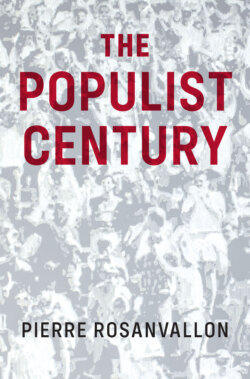Читать книгу The Populist Century - Pierre Rosanvallon - Страница 20
Democracy polarized
Оглавление“Government by judges” is an expression that has often been used in France to stigmatize what has been perceived as a threat: the increasing authority of a judiciary that has become more and more independent in many democracies. Populists denounce this independence in particular when it is expressed through the development of jurisprudence that amplifies a law in the process of interpreting it. Marine Le Pen has hammered away at this point in a typical refrain: “Judges are there to apply the law, not to invent it, not to thwart the will of the people, not to replace legislators. A public office is not supposed to authorize its holder to usurp power.”6 Some have not even hesitated to use the newly coined term “juridictatorship” to characterize the independence of the magistracy and the extension of the authority of France’s Constitutional Council,7 qualifying the rule of law as “the central error” of contemporary democracies. The opposition between law and democracy is not a new one. It was the focus of many arguments during the American and French Revolutions, leading the writers of the French Constitution, in 1790, to adopt the principle of electing judges. (Called into question later on, this principle remained a republican demand throughout the nineteenth century.) For their part, many American states also instituted mechanisms for electing judges; these systems are still in place.8 But the law/democracy opposition has been radicalized in the populist vision, which deems that the magistracy can claim only a narrow functional legitimacy, and that the democratic status of this legitimacy is secondary to that of the elected officials who have been anointed by popular vote. In this case, we can speak of a polarized vision of legitimacy and of democratic institutions, in which voting is seen as the unique means of democratic expression. (This vision leads in turn to the view that democracy itself is a procedural matter, lacking any substantive dimension; the term might characterize, for example, the quality of an institution and its operations.)
This way of grasping democracy has been translated more broadly in populist regimes by the imposition of constraints on – or even the suppression of – independent authorities, the most striking manifestation of which has been the reduced jurisdiction of constitutional courts. At the very heart of the European Union, the adoption in 2011 of the new Hungarian Constitution caused a stir, so severely had the powers of the country’s Constitutional Court been reduced by a revision pursued and intellectually justified by supporters of Viktor Orbán. Following a different procedure, the independence of a comparable institution was seriously curtailed in Poland as well. Although these countries received vigorous critiques from the authorities in Brussels, they were not persuaded to revise their approach. On the contrary, they have defended themselves as being ardent servants of the sovereignty of the people; in their eyes, the broad mandates granted to their constitutional courts during the postcommunist transition period are no longer justified in a stabilized democracy in which the people have become truly sovereign. Similar processes have been followed in Bolivia and Venezuela, and also in Turkey and Russia (let us note that in Russia the notion of “sovereign democracy” has been foregrounded to characterize this mechanism of polarization9).
